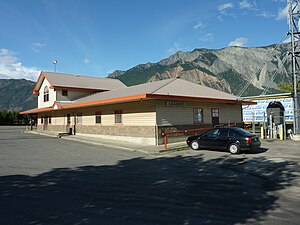Lillooet, British Columbia
| Lillooet | |
|---|---|
| District municipality | |
| District of Lillooet | |
| Location of Lillooet in British Columbia | |
| Coordinates: 50°41′11″N 121°56′11″W / 50.68639°N 121.93639°W | |
| Country |
|
| Province |
|
| Region | Lillooet-Fraser Canyon |
| Regional District | Squamish-Lillooet |
| Incorporated | 1946 (as village), 1996 (as district municipality) |
| Government | |
| • Mayor | Marg Lampman |
| • Governing body | District of Lillooet |
| • MLA | Jackie Tegart (BC Liberals) |
| • MP | Jati Sidhu (Lib) |
| Area | |
| • Total | 27.51 km2 (10.62 sq mi) |
| Elevation | 250 m (820 ft) |
| Population (2011) | |
| • Total | 2,321 |
| • Density | 84.4/km2 (219/sq mi) |
| Time zone | PST (UTC−8) |
| • Summer (DST) | PDT (UTC−7) |
| Postal code span | V0K 1V0 |
| Area code(s) | 250 |
| Highways |
|
| Waterways | Fraser River, Bridge River, Cayoosh Creek, Seton Lake |
| Website | http://www.lillooetbc.com/ |
|
Lillooet railway station
|
|
|---|---|

Lillooet Railway station
|
|
| Location | Main Street, Lillooet, British Columbia Canada |
| Coordinates | 50°41′05″N 121°56′10″W / 50.6847°N 121.9360°W |
| Owned by | CN and First Nations |
| History | |
| Previous names | BC Rail |
Lillooet (English pronunciation: /ˈlɪloʊ.ɛt/), formerly Cayoosh Flat, is a community on the Fraser River in British Columbia, Canada, about 240 kilometres (150 mi) up the British Columbia Railway line from Vancouver. Situated at an intersection of deep gorges in the lee of the Coast Mountains, it has a dry climate- 329.5 millimetres (13 in) of precipitation is recorded annually. Lillooet has a long growing season, and once had prolific market gardens and orchard produce. It often vies with Lytton and Osoyoos for the title of "Canada's Hot Spot" on a daily basis in summer.
Lillooet is an important location in Aboriginal history and culture and remains one of the main population centres of the St'at'imc (Lillooet Nation), and today it is one of the southernmost communities in North America where indigenous people form the majority. Just over 50 per cent of the people in Lillooet and area are St'at'imc. First Nations communities assert the land as traditional territory since time immemorial. Considered to be one of the oldest continuously inhabited locations on the continent, the area is reckoned by archaeologists to have been inhabited for several thousand years. The immediate area of the town attracted large seasonal and permanent populations of native peoples because of the confluence of several main streams with the Fraser and also because of a rock-shelf just above the confluence of the Bridge River which is an obstacle to migrating salmon. Many archaeological and heritage sites are in the vicinity of the town, including Keatley Creek Archaeological Site, one of the largest ancient pit-house communities in the Pacific North West.
...
Wikipedia

